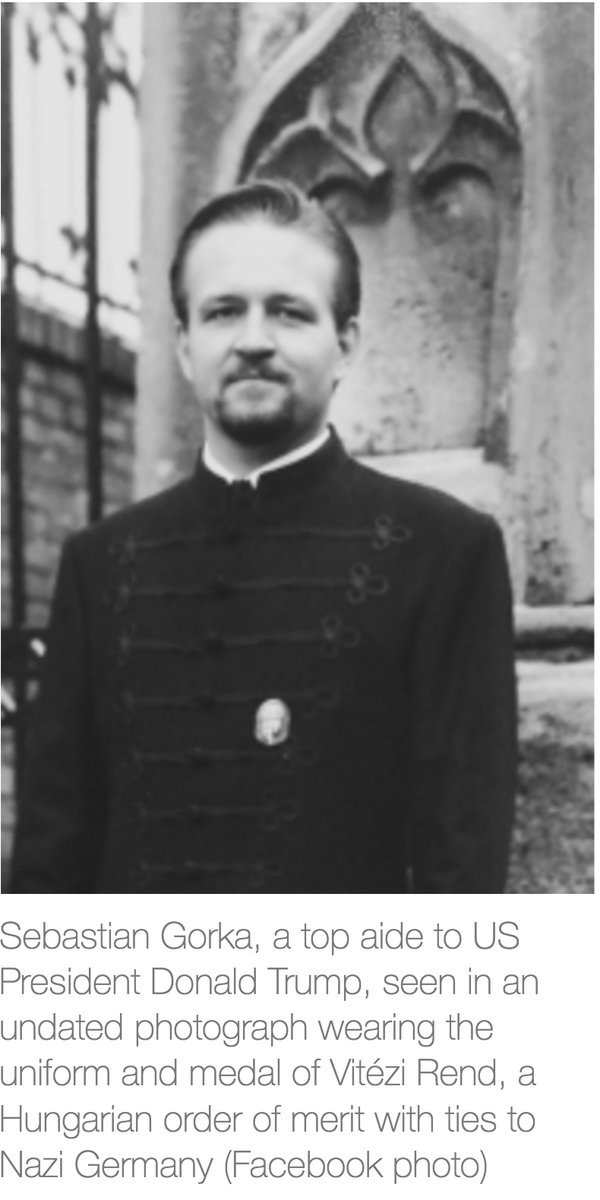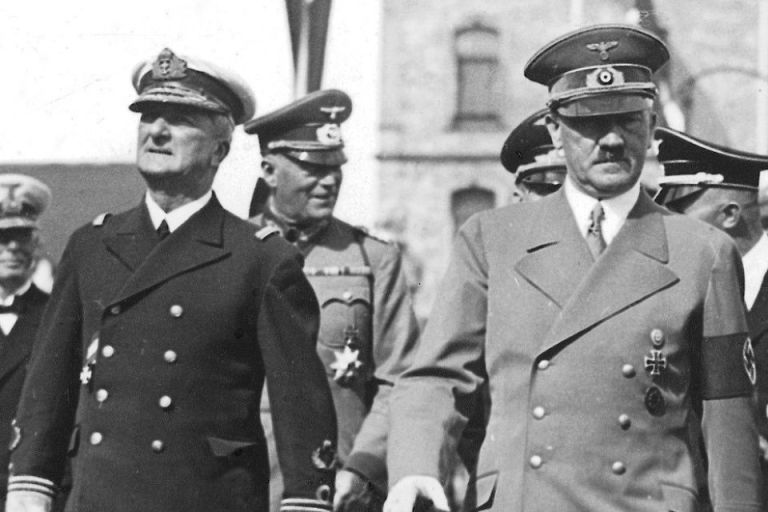
In my last blog I wrote about how Sebastian Gorka, Deputy Assistant to President Donald Trump, appears to have tried to suggest that a short period in a British Army reserve intelligence unit in the early 1990s adds to his credibility as an ‘expert’ in counter-terrorism. In fact it seems extremely unlikely that Gorka would have gained any operational experience during his service and in reality the unit that he was a member of had no counter-terrorist role – in Northern Ireland, mainland Britain or anywhere else – at that time.
Perhaps more troublingly, recent reports have highlighted Gorka’s habit of wearing the insignia of the Vitézi Rend, a hereditary order of military merit created by the Hungarian ruler Admiral Miklós Horthy in 1920. In 1941, Horthy took Hungary into the Second World War on the side of Nazi Germany and was still Head of State in the summer of 1944 when Adolf Eichmann began deporting Hungary’s Jewish minority to Auschwitz for extermination. Membership of the Vitézi Rend continued to be awarded until Horthy was deposed, at gunpoint, by Nazi German intelligence and special forces personnel in October 1944.
At the end of the war, the Vitézi Rend was abolished along with a number of other organisations and political parties which had been entangled with both Admiral Horthy’s government and the subsequent fascist ‘Arrow Cross’ puppet government of Ferenc Szálasi. At this time it was listed by the US State Department as an organisation linked with Nazi Germany. The Vitézi Rend has not been reconstituted by the Hungarian state and nowadays exists in the form of a number of competing private associations of a broadly right-wing, nationalist – and in some cases anti-semitic – character which seek to claim the heritage of the order, and the prestige, if that is the right term, of the Horthy era.

Miklós Horthy (left) and friend.
Admiral Miklós Horthy (1868-1957) was appointed Commander in Chief of the Austro-Hungarian Navy in February 1918 and led it until the defeat of the Central Powers in Europe and the collapse of the Austro-Hungarian Empire in the autumn of 1918. In 1919, Horthy was asked by the government of Hungary to take command of a counter-revolutionary army to help put down a Bolshevik coup, led by the revolutionary Bela Kun. This was accomplished, with the help of Romanian forces, by the autumn of 1919 and Hungary was re-established as a parliamentary monarchy, with the odd proviso that it had no monarch, as the victorious allies would not allow the King – the former Austro-Hungarian Hapsburg Emperor Karl IV – to return to the country to take up the throne. Consequently, the Hungarian parliament elected Horthy as Regent and Head of State. A position that he held until he was deposed by the Nazis who were unhappy that he was trying to extricate Hungary from the war against the Soviet Union.
Doubtless, Miklós Horthy was not a nice man by current standards. He allied Hungary – albeit reluctantly – with Nazi Germany, instituted anti-semitic laws and did far less than he could and should have done when the Nazis began to deport Hungary’s Jewish population to Auschwitz in the summer of 1944. But he was neither a fascist nor a Nazi, except in the rather crass sense that the modern left applies to right-wing people whose views or actions they particularly dislike. Instead he was a reactionary, irredentist, monarchist, nationalist conservative whose primary motivation in co-operating with Hitler and Nazi Germany was to recover territory lost by Hungary at the Treaty of Trianon in 1920. He was certainly personally anti-Semitic but his record suggests that he made efforts from time to time to protect Hungary’s Jewish minority from the worst excesses of the Hungarian radical right. It was nowhere near enough of course and he shamefully failed to prevent the Nazi extermination of Hungarian Jews in 1944 but his relationship with Nazi Germany was sufficiently ambiguous that he was not prosecuted by the Allies at the end of the war and died in retirement in Portugal in 1957.
So does Gorka’s wearing of the medal and use of the title ‘vitéz’ imply that he has neo-Nazi or anti-semitic links as some commentary has suggested? Well possibly. Gorka certainly has links to the Hungarian nationalist right and within that spectrum there are some more or less open anti-semites and neo-Nazis. Although Gorka has denied any connection with the extremist right it doesn’t seem too far-fetched to suppose that he came into contact with them, but that certainly doesn’t mean he shared their views and I don’t think there is any actual evidence to suggest that Gorka is a fascist or Nazi. On the other hand, Gorka’s own explanation suggests that a different interpretation of the significance of his wearing the Vitézi Rend might be a better fit.
Gorka told the London Daily Telegraph that: “My father was nine years old when the Second World War started… I was born in 1970. Neither of us could be guilty of what they’re stating.”
Which is perfectly true. Realistically, neither can be associated with the crimes of the Horthy era. Equally however, neither can be associated with the actual Vitézi Rend, which was abolished in 1945. At best, the medal that Gorka wears is something that he (or his father, as the award is supposedly hereditary) was either awarded by one of the several competing non-state groups which claim to be able to award the medal, or he simply awarded it to himself.
Naive soul that I am, I was unaware, until a few years ago, that there is a thriving market in bogus titles of chivalry and nobility. The scales were lifted from my eyes when I followed the unmasking – on the British ‘Army Rumour Service‘ website (a raucous and very unofficial discussion forum for serving and ex-members of the British Army) – of James Shortt, an ex-nurse and martial arts instructor who constructed a glorious military history for himself and then seems to have spent much of the 1990s selling military training to the newly emerging democracies of Eastern Europe. Shortt claimed, amongst other things, to have been awarded a Papal knighthood for his contribution to bringing the Cold War to an end and also, surprise, surprise, to be a Vitézi Rend. Further poking around the grubby recesses of the internet throws up all kinds of examples of people who have awarded themselves titles of nobility and knighthoods, whilst the fraudulent wearing of military decorations with the intent to obtain tangible benefits led the US Congress to pass the Stolen Valor act in 2013 (a British version is also under discussion).
Why do people award themselves medals and titles? Ironically, I suspect, it’s to gain respect which they wouldn’t otherwise receive and which they don’t deserve. A bit like claiming operational counter-terrorist experience. Oddly enough, soon after I published my first blog on Gorka, I was contacted by a former schoolmate of Gorka’s from St Benedict’s in Ealing. He told me that Gorka hadn’t played ‘Number 8’ for the school rugby XV as he’d claimed in one interview. It does all seem to fit into a pattern.

“It does all seem to fit into a pattern” Of what? Declaiming about someone based on innuendo and unsubstantiated criticism?
As you well know; he was a qualified operator in Int & Sy Gp (v) and he has never claimed that medal as anything other than as an honour of his father. A father incidentally who risked his life as a “friend” of the British interest during the 50’s.
I know this will have nil impact on the trolls feeding off this but hopefully it’ll be taken into account by others.
I’m happy to assume that Gorka passed out of basic training with 22 Coy. There is no evidence that he did any more than than that. Consequently, I see nothing to suggest that his experience over two or three years as a reservist recruit in the British Army will have contributed to any special expertise in counter-terrosirism..